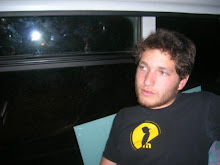Friends,
In honor of the Jewish New Year (Rosh Hashanah), I'd like to share with you a mock speech I wrote for a seminar I took earlier this year, called Cultural Gaps in Negotiations.
The brief intro: as part of our seminar paper, we had to pick a topic of our choosing addressed to a population of our choosing and deliver a speech to said population in a language that would accepted to both Israelis and the intended recipients. Our professor decided to take our 'speeches' and make a project out of it, and this website is what came of it all. His goal, in essence, is to reach out to the Arab and Muslim worlds and show that there are serious partners in Israel to talk with.
I believe deeply that water can be used as a bridge in this region, so my choices already seemed predetermined for me: Water and the Palestinians.
My "dream speech" of sorts can be read HERE in English and HERE in Hebrew.
Next month I leave my room in Tel Aviv to go learn intensive Arabic for 5 months-- inshallah by the time I finish the program I will translate it into Arabic as well! The real dream, of course, is to translate some of the concepts here into reality...
Below I provide basic quotes in English to get the reader in the mindset, and following is an introduction I wrote for my Hebrew audience.
Background:
“Resolution of issues related to fresh water that is
shared by Israel and Palestine will not alone bring about peace between the two
peoples. State borders, Israeli
settlements, Palestinian refugee, and the status of Jerusalem far outweigh
water as divisive issues. However, in
the absence of a just resolution of water issues, no peace can be
complete. Further, in the absence of a sustainable
use of water by both peoples, overall social and economic development will be
threatened, and so too will stability and peace for the region” (Brooks and
Trottier, 2012).
“We look forward to the day when a new forum will allow
us to interact with our Israeli counterparts as respected partners and equals,
working jointly to solve problems in the interests of all” (Palestinian Water
Minister Shaddad Attili, speaking at World Water Week, August 2011).
“We suggest careful attention to the three-part aphorism
ascribed to Rabbi Hillel, who lived at the start of the first millennium and
was perhaps the greatest of the Jewish sages. He began by asking: “If I am not
for myself, who will be?” This can be seen as support for the Israeli position.
However, Hillel did not stop there; he went on to ask: “If I am only for
myself, what am I?” This is an equal statement of support for the Palestinian
position. And Hillel concludes with a third question: “If not now, when? [We
urge the parties to deal with water immediately rather than wait for political
solutions.]” (Brooks and Trottier, 2012).
-------
פעם ראשונה שהבנתי את המשמעות של מים בסכסוך
הערבי-ישראלי היתה באביב 2009, כסטונדט בתוכנית הבינ-לאומית של אוניברסיטת בן
גוריון. הייתי בקורס שנקרא Hydropolitics of the Middle East, תחת ד"ר קלייב ליפשין, ושם
קבלתי את הבסיס המושגי לגל של נושאים ורעיונות שמאז מעסיקים אותי יומם וליל. בעיניי הצנועות והמוגבלות, אני רואה סכסוך שנדרש
לצאת מהקופסה הקונבנציונלית בכדי לפתור אותו.
יש שני צדדים, שבעקבות מאה שנים של אלימות, הבטחות שבורות, ועוד אלימות,
אינם סומכים אחד על השני—ובוודאי שאין אמון.
בחמש השנים האחרונות שמתי יותר לב לפרויקטים משותפים של מדינת ישראל
ומדינות אחרות בעולם: ארצות
הברית, סין, והודו, כדוגמאות.
החל מכנס מדריד ב1991 גם בין הישראלים לפלסטינים יש שיתוף פעולה ברמה
הרשמית ורמות הפרטיות וארגונים חוץ ממשלתיים (NGO). אלו פרויקטים שמייצגים התחלות טובות, אבל על
הצד הישראלי לשים לב לציטוט הנ"ל של שר המים הפלסטיני, שאדד אטילי. המילים שבהן הוא משתמש – שהוא רואה את הישראלים
כ"שותפים מכובדים ושיוויוניים," שיום אחד יראו את הפלסטינים באותו אור,
מסמנות לי מן מנורה שצריכה להידלק בראש הישראלי.
זאת אומרת, היחס בדיבורים צריך להשתנות כדי להראות ערכים שונים מאילה שמקרינים
היום.
תוך שימוש במונחים שנלמדו בספרו של ד"ר עפר
גרוסברד, חיפשתי דרך יצירתית להציג שילוב של בבל ומים כדי ליצור נקודת
תחילה של אמון חדש בין עמינו. בבל נותן
לכל קורא כלים והנחיות אינטגרליים שמאפשרים לו לגשר לצד השני. ומים, או יותר נכון- שיתוף פעולה על בסיס מים,
הוא הדבר הקונקרטי שדרכו אפשר לצעוד על הגשרים.
רק כשאנשים יראו שיתוף פעולה שמצליח (עוד מים לכל אזרח, מים יותר נקיים,
מפעלים חדשים ליד כפרים ועיירות...), יווצר מצב שבו העם הפלסטינאי יקבל את סמכות
הרשות, ויהיה ואמון אמיתי בין שתי הממשלות.
לכן, למטה אני בונה מצב תיאורטי על מנת לתת לעצמי את הזדמנות חיי-- הזדמנות
להיות מנהיג ישראלי שפונה אל מנהיגי ואנשי העם הפלסטיני כאחד במסווה של כנס מים
בין לאומי. השתמשתי ברעיוניות של בבל,
מקורות שדנים על היסטוריה של בטחון המים ושיתוף הפעולה סביבו, הצעות לפרויקטים
עתידיים, היסטוריה איסלאמית כללית, וכתבי קודש של היהדות והאסלאם (כדי למצוא
טקסטים ומושגים מקבילים בשתי הדתות). ככה
יצא נאום שבשאיפה: א) מראה כבוד, הזדהות, וסמכותיות; ב) משתמש בטריקים קטנים אך
משמעותיים כמו מטפורות, איזון דרך דוגמאות מקבילות לכל נושא, וכתבי קודש; וג)
עדיין יכול להיות נאום שמעוכל בציבור הישראלי.
